Improve website rankings and
pagespeed with Google Lighthouse.
- Pagespeed (Performance)
- Progressive Web App
- Accessibility
- Best Practices
- SEO
Google is phasing out its proprietary web performance offering, Pagespeed Insights in favor of the Google Lighthouse speed test, a more comprehensive web performance, and free SEO audit tool. Google Lighthouse combines Pagespeed Insights (formerly the “go-to” Pagespeed tool) with new features for auditing site structure, User Interface (UI), and SEO. Here’s how Google Lighthouse works and how to get the most out of this great website tool. This guide will help you improve your website rankings and pagespeeds using the new audit tool called Google Lighthouse
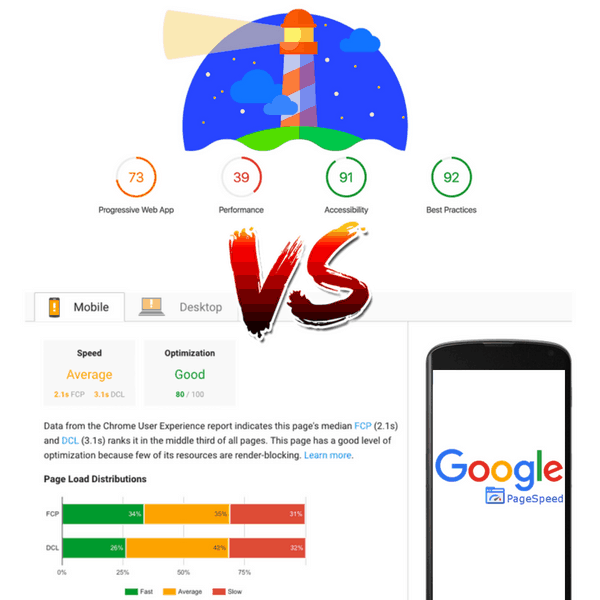
To access the Google Lighthouse speed test, select “More tools” in Google Chrome (you must use Google Chrome for this tool), then click “Developer Tools,” and run an audit. You may also simply press F12 on your keyboard. The audit produces five easy to understand scores at the top of your audit report. These include:
Understanding how to optimize each of these metrics will improve your tactical website performance and search engine algorithm ranking tremendously.
The performance score measures how fast your content (text, images, videos) takes to load while offering suggestions to help speed up your website. Pagespeed Insights analyzes page speed in a similar manner, except for a few vital flaws. For example, a website that uses cascading style sheets (this tool loads data at the top of the website first, and continuously loads the rest of the website in a downward vertical fashion) loads content much faster than a traditional style web page. Although this loading method generally leads to a visual speed improvement, Pagespeed analyzes the entire page rather than through segmented “cascading” load times. Google Lighthouse now analyzes the performance advantage from “the fold” (what you first see on the web page) – down, simulating a user’s experience with a page load time.
Here’s a useful breakdown from Addy Osmani at Medium.
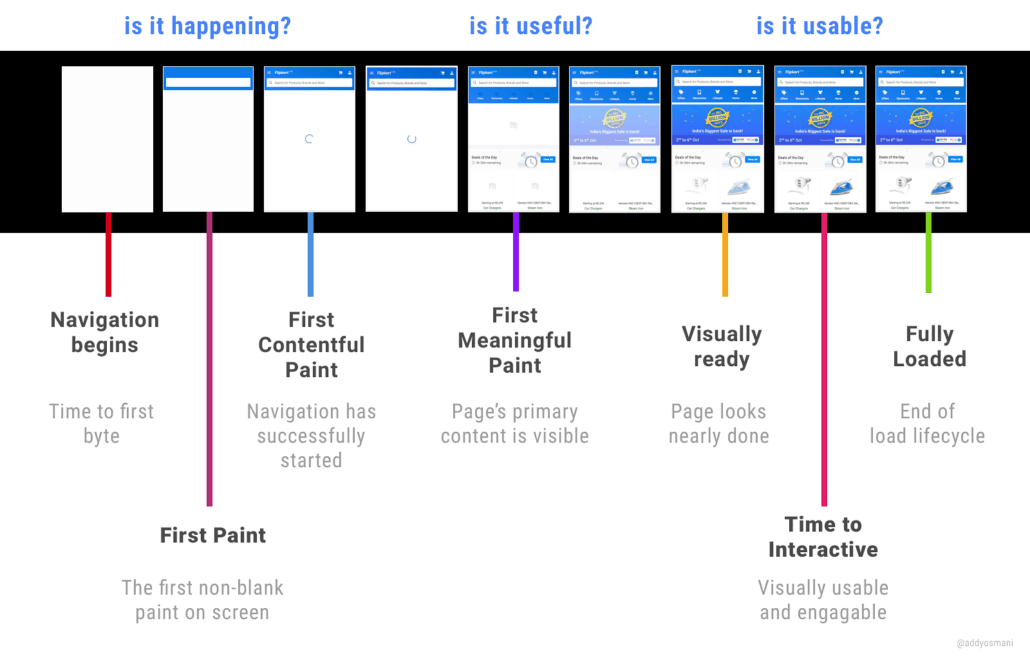
The “Progressive Web App” tool the Google Lighthouse service measures your website’s reliability, speed, and engagement. This test analyzes how well your website responds on mobile devices and tablets. A large part of your score is based on how your website adapts to different devices, networks and screen sizes. If your content is aligned in a single column on a smartphone but widens to two columns to fit a tablet’s larger screen, it is likely Google Lighthouse will recognize this efficiency.
Making sure all of your site’s pages are connected to individual URLs is important in the Progressive Web App category; these pages should be able to load at least partial content while users are offline or in airplane mode. Finally, Google Lighthouse checks off simple boxes such as ensuring your website works on different browsers, at high initial loading speeds—even on a 3G network.
The “Accessibility” test contains the highest number of audits, at 35. Its main goal is to rate how clear your website’s content is transmitted to visitors. These visitors include users of assistive technology; Google Lighthouse puts a high priority on delivering accessible content to all website users. To do well in the Accessibility audit, it is important for your website to have well-structured elements with discernible names that describe your content clearly.
There are other tools such as “Pingdom,” a free ping URL service, which scores you purely based on the time it takes to download everything from your website. This sounds simple and effective, however, Pingdom actually fails to take rendering time into account—a major drawback—unlike Google Lighthouse and Pagespeed Insights. As you can see, some of these page speed tools have limitations, but what about Google Lighthouse?
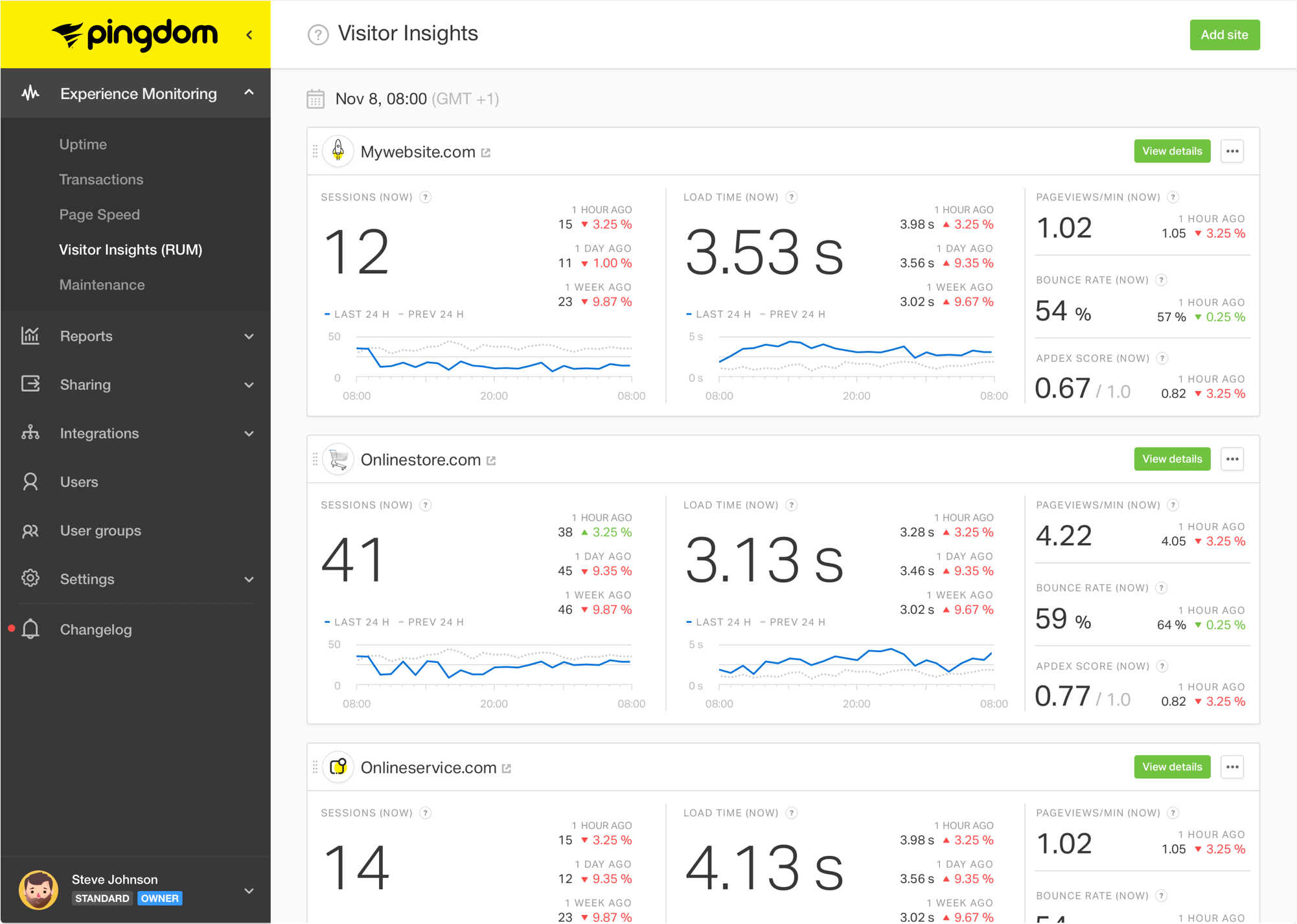
Let’s take a deeper look into how much Google Lighthouse really helps measure Pagespeed. Remember, if you want to test Lighthouse out for yourself, all it takes is the press of a button (F12). If you have an older version of Chrome, you can download the Lighthouse chrome extension plug-in via their Chrome Plugins website.
Google Lighthouse brings the best from all worlds of testing google site speed, creating a powerful SEO/website-speed analyzing engine. Lighthouse checks website speed prioritizing the websites mobile form first—unlike Pagespeed Insights. This is important in a world where more than half of website interaction is done via smartphone. Also, while almost all mobile versions of websites load clearly on a desktop, the same cannot be said for desktop-origin based websites. Google Lighthouse allows us to perform a useful SEO audit. If we look at SunCity Advising SEO, a score of 100 is awarded—all ten audits were passed.
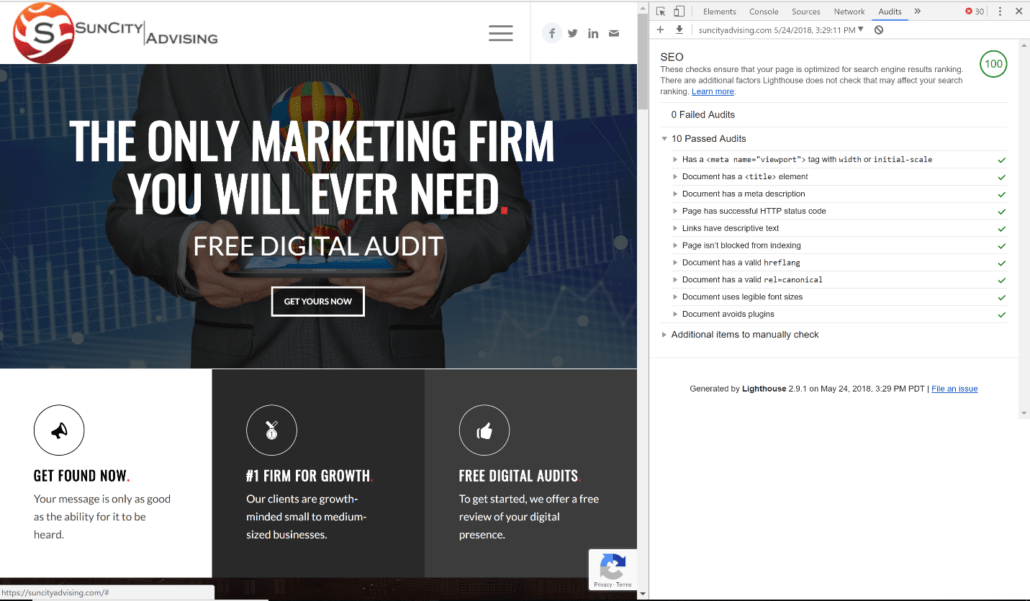
The SEO analyzer within Lighthouse checks for attributes including a title element, meta description, descriptive text, legible font size, and more. Obviously, these elements are not the only requirements of practicing effective search engine optimization, but it points out serious red flags that could decrease your search ranking, even with a speedy website.
PageSpeed matters. If your potential customer cannot find the information they are looking for, they will look elsewhere and abandon your sales acquisition funnel. Additionally, if Google determines that your website performance is substandard, your search engine ranking will suffer accordingly. Pagespeed Insight was a useful tool for the early SEOs and armchair digital marketers but Google has taken website auditing to the next level with progressive web apps, development and image compression. The Google Lighthouse speed test also audits your website’s mobile performance.
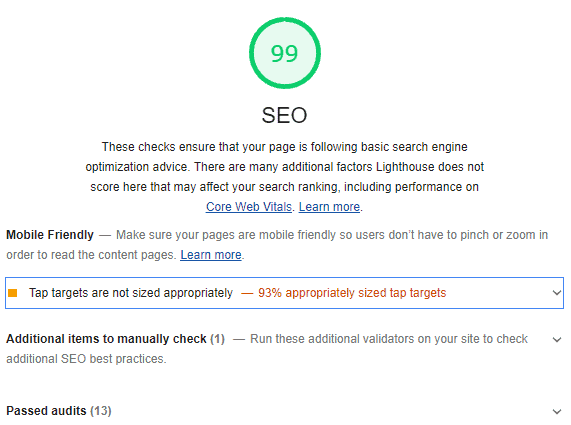
The challenge of fully optimizing your website to maximize page speed and obtain higher Google rankings can take 50+ hours if you do not have the required expertise in SEO, web design, and high-level coding. SunCity Advising’s page speed optimization team is ready at a moment’s notice to put your website through a ranking-driven boot camp. Our team utilizes both Google Lighthouse and PageSpeed Insights, along with other premium marketing analysis tools such as SEMRush. SunCity Advising manages these comprehensive page speed elements for businesses that want to rank higher on Google:
Interested in learning more about Pagespeed tools and how to improve your website ranking through improving web performance? Contact us!
Please fill out as much information below as possible based upon your expected page speed history, requirements, and goals.
Ivan Reed is the CEO of SunCity Advising. His client portfolio includes successful partnerships with startups, small businesses, medium-sized firms & large corporations. SunCity Advising specializes in developing high performing websites, including services in SEO, paid media advertising, social media, email marketing and other digital marketing solutions.
We provide every client with a hands-on account manager that takes ownership in, and is held accountable for, the successful results of your growth strategy!
The SunCity Advising marketing team is much more than a digital marketing company — reach out to see why our clients trust our firm with all of their tough digital marketing decisions.
Address:
SunCity Advising
7924 Ivanhoe Ave. Suite 1
La Jolla, CA 92037
Marketing Contact:
Ivan Reed
(858) 859-0123
info@suncityadvising.com
Monday: 8:00am-8:00pm PST
Tuesday: 8:00am-8:00pm PST
Wednesday: 8:00am-8:00pm PST
Thursday: 8:00am-8:00pm PST
Friday: 8:00am-8:00pm PST
Saturday: 8:00am-4:00pm PST
Sunday: 12:00pm-4:00pm PST

 How to Write a Press Release
How to Write a Press Release